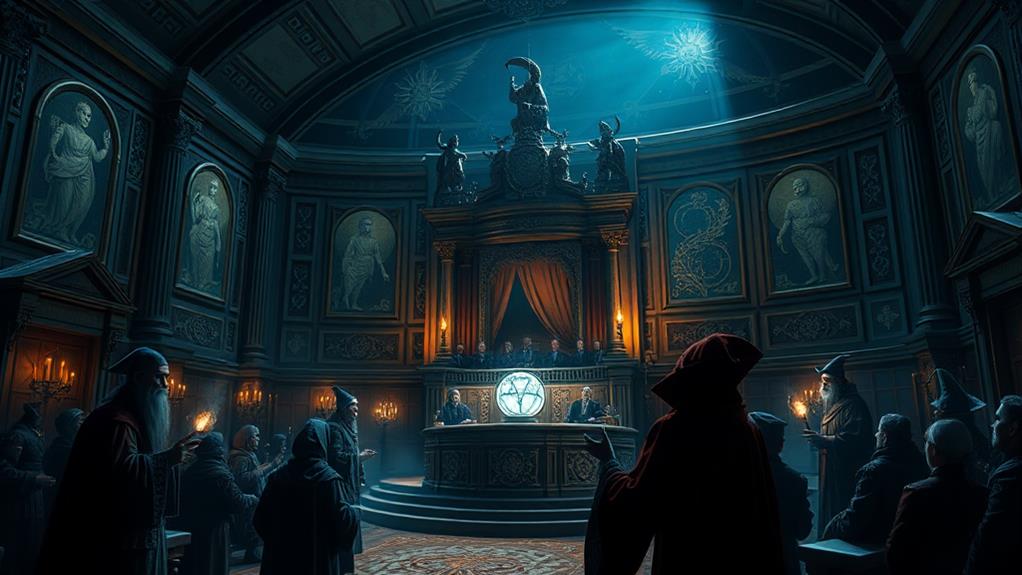
You'll find that several wizarding trials have become legendary for their impact and drama. Gellert Grindelwald's trial in Nurmengard prison ended his reign of terror. Bellatrix Lestrange faced justice for her heinous acts, including torturing the Longbottoms. Sirius Black's wrongful imprisonment without trial serves as a grim cautionary tale. Igor Karkaroff's tactics to avoid Azkaban by betraying fellow Death Eaters added intrigue. Then there's the fraught tribunal of Severus Snape, whose loyalty was hotly debated. Other notable trials include Dolores Umbridge's abuses, Harry Potter's unjust trial, and more. Discover the intricate details of each riveting trial next.
The Trial of Gellert Grindelwald
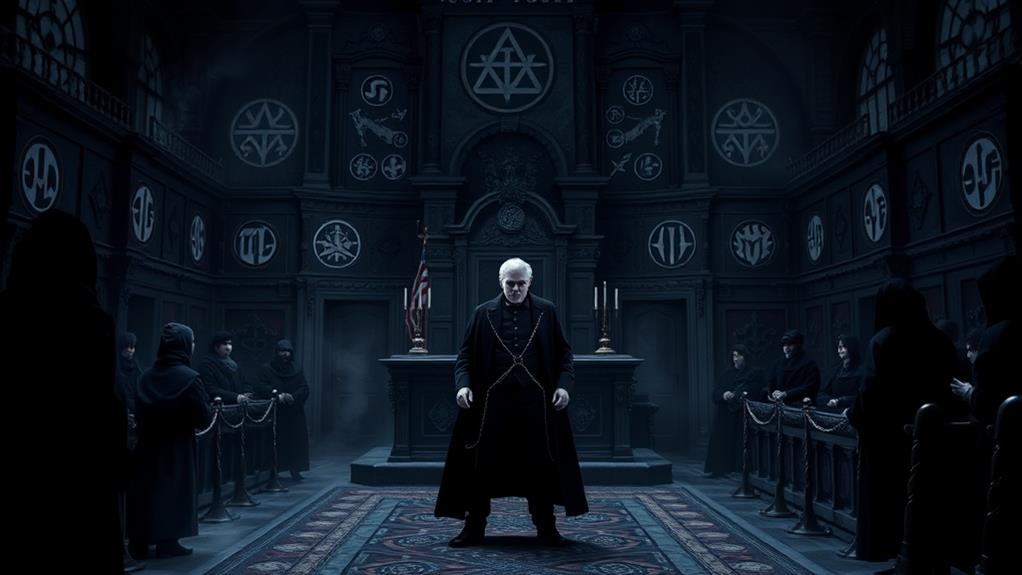
Delving into the notorious Trial of Gellert Grindelwald, you’ll instantly recognize its significance in wizarding history. This trial marked the end of an era filled with dark ambitions and widespread fear. Grindelwald, known for his infamous slogan “For the Greater Good,” sought to establish a new world order dominated by wizards over Muggles. His reign of terror culminated in a climactic duel with Albus Dumbledore in 1945. This monumental duel, often regarded as one of the most iconic in wizarding history, showcased the extraordinary skill and power wielded by both adversaries, with legendary wands for wizard duels playing a pivotal role. The Elder Wand, in particular, was central to Grindelwald’s rise to power and his ultimate defeat. His imprisonment in Nurmengard marked the downfall of one of the most dangerous dark wizards of all time, bringing a sense of hope and renewal to the wizarding world. The repercussions of the trial and the duel resonated throughout the wizarding community, leading to a period of reflection and reform aimed at combating dark forces. As the dust settled, the stories of legendary wizarding battles explored during this time were passed down through generations, serving as cautionary tales and sources of inspiration. The legacy of Grindelwald and his defeat not only reshaped the perception of power within the wizarding world but also underscored the importance of unity in the face of darkness.
You'll find that the trial itself was a pivotal moment. Capturing Grindelwald wasn't just about stopping a dark wizard; it was about restoring order and hope to the wizarding world. The proceedings were held in the highly secure Nurmengard prison, where Grindelwald himself was imprisoned. The trial drew immense attention, symbolizing justice and the triumph of good over evil.
During the trial, witnesses presented chilling testimonies of Grindelwald's atrocities, and the evidence was overwhelming. The outcome was inevitable: Grindelwald was sentenced to life imprisonment. His trial was more than just a legal formality; it was a statement that no one, no matter how powerful, is above the law. This event remains a cornerstone in the annals of magical jurisprudence.
The Wizengamot and Dolores Umbridge
How does one even begin to comprehend the complex relationship between the Wizengamot and Dolores Umbridge? You must explore into the intricacies of power, politics, and moral ambiguity. As Senior Undersecretary to the Minister for Magic, Umbridge wielded significant influence, often using her position to mold the Wizengamot's decisions to her advantage. Her role in the trials of Muggle-borns during Voldemort's control of the Ministry exposed her malevolent nature.
You can't ignore how she manipulated the legal system, pushing for harsh sentences under the guise of lawful justice. Her infamous trial of Mary Cattermole, where she sentenced the innocent witch to Azkaban, epitomized her brutal misuse of power. Umbridge's actions were later scrutinized, leading to her own trial by the very institution she once controlled.
The Wizengamot, traditionally a body of impartiality, faced criticism for allowing Umbridge such latitude. You see, the trial of Umbridge post-Voldemort era marked a significant moment of reckoning. She was found guilty of numerous crimes, including abuse of power and the torture of students at Hogwarts. This trial wasn't just about justice for her victims; it was about restoring integrity to the Wizengamot itself.
The Trial of Ludo Bagman
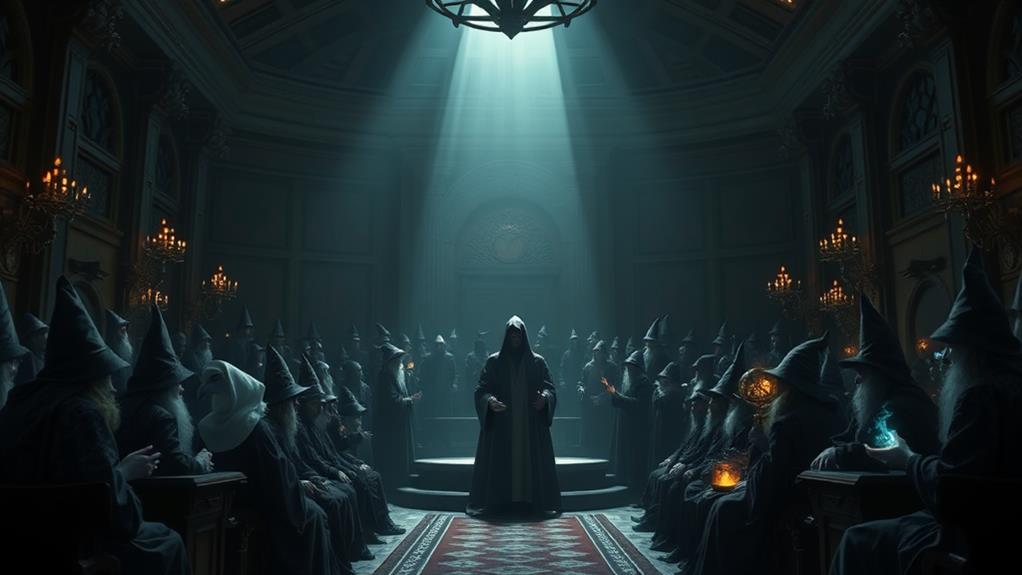
While Dolores Umbridge's trial marked a significant moment of reckoning for the Wizengamot, Ludo Bagman's trial offered a different spectacle altogether. You might recall Bagman as the celebrated Beater for the Wimbourne Wasps and later, the head of the Department of Magical Games and Sports. His trial, however, revolved around allegations that he had passed information to Death Eaters during the First Wizarding War.
The courtroom buzzed with curiosity rather than tension. Bagman, with his jovial demeanor and charm, didn't fit the typical profile of a Death Eater. When you look at how he presented himself, it seemed almost like he was on trial for a minor Quidditch foul rather than serious charges of espionage. His defense leaned heavily on his claim of ignorance—he argued that he had no idea the individuals he was dealing with were Death Eaters.
In the end, the jury was swayed by his charisma and lack of concrete evidence against him. Bagman walked free, leaving the wizarding community divided. Some believed in his innocence, while others viewed his acquittal as a miscarriage of justice. The trial remains a contentious chapter in Wizengamot history.
The Case of Sirius Black
Few cases in wizarding history have sparked as much debate and controversy as the trial of Sirius Black. Accused of betraying Lily and James Potter to Voldemort and causing their deaths, Black was also charged with the murder of twelve Muggles and Peter Pettigrew. The evidence seemed overwhelming. Aurors found Black laughing maniacally at the scene, and Pettigrew's severed finger was the only trace left of him.
You might wonder why Black didn't receive a proper trial. In the panic following Voldemort's fall, the Ministry of Magic prioritized swift justice over due process. Without a trial, they sent him straight to Azkaban. Despite numerous pleas from Black, the Ministry never revisited his case, believing his guilt was beyond question.
Years later, you'd learn that Black was, in fact, innocent. He had been framed by Pettigrew, who had faked his own death and lived as a rat for years. This revelation turned the wizarding world upside down, proving that even the most damning evidence can be misleading.
Black's case remains a cautionary tale about the dangers of rushing to judgment and the importance of due process in ensuring true justice.
The Trial of Morfin Gaunt
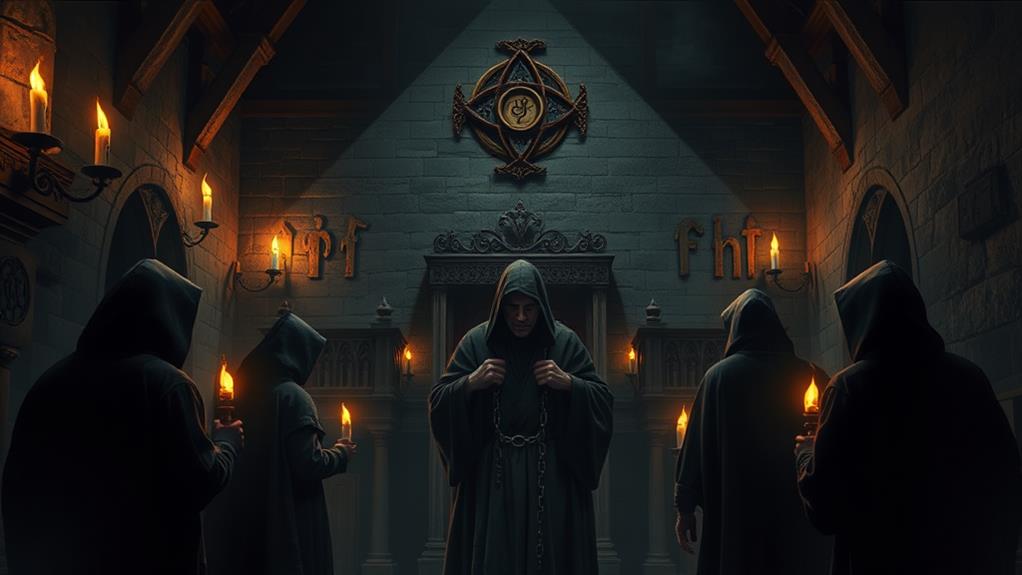
Much like Sirius Black, Morfin Gaunt's trial is another example of the wizarding world's flawed justice system. Morfin, a member of the infamous Gaunt family, was accused of attacking Tom Riddle Sr. and his parents. However, the trial was far from fair. The Wizengamot didn't bother to weigh the evidence that might exonerate him or even look into the possibility of memory tampering.
You see, Morfin was convicted largely because of his family history and personal demeanor. The trial was swift, and no one questioned the legitimacy of his confession, which had been altered by Tom Riddle Jr.
| Aspect | Sirius Black's Trial | Morfin Gaunt's Trial |
|---|---|---|
| Accusation | Mass murder, betrayal | Attacking Muggles |
| Evidence Ignored | Lack of fair trial, no wand | Confession tampered |
| Outcome | Life in Azkaban | Life in Azkaban |
| True Culprit | Peter Pettigrew | Tom Riddle Jr. |
Morfin spent the rest of his life in Azkaban, a fate that could've been avoided if the justice system had been more thorough. The trial's mishandling highlights the dangerous consequences of prejudice and negligence within the wizarding legal framework.
The Wizengamot and Harry Potter
In stark contrast to Morfin Gaunt's trial, Harry Potter's encounter with the Wizengamot had a very different context but still showcased the wizarding legal system's flaws. You see, Harry's trial wasn't about a heinous crime but rather a petty infraction: using magic in front of a Muggle. Despite the trivial nature of the accusation, it was blown out of proportion, highlighting the Ministry of Magic's bias and inefficiency.
When Harry received his summons, you could sense the Ministry's intent to discredit him. Cornelius Fudge, then the Minister of Magic, aimed to undermine Harry's credibility and silence his claims about Voldemort's return. The trial took place in the intimidating Courtroom Ten, the same chamber used for serious offenses, which was entirely unwarranted for Harry's supposed crime.
Throughout the proceedings, you couldn't ignore the lack of fairness. The Wizengamot, led by Fudge, dismissed key evidence, including Dumbledore's testimony. They seemed more preoccupied with political maneuvering than seeking the truth. Yet, despite the stacked odds, Harry's resilience and Dumbledore's defense prevailed, and Harry was acquitted. This trial exposed the Ministry's corruption and its impact on justice, making it one of the most notorious wizarding trials.
The Trial of Igor Karkaroff
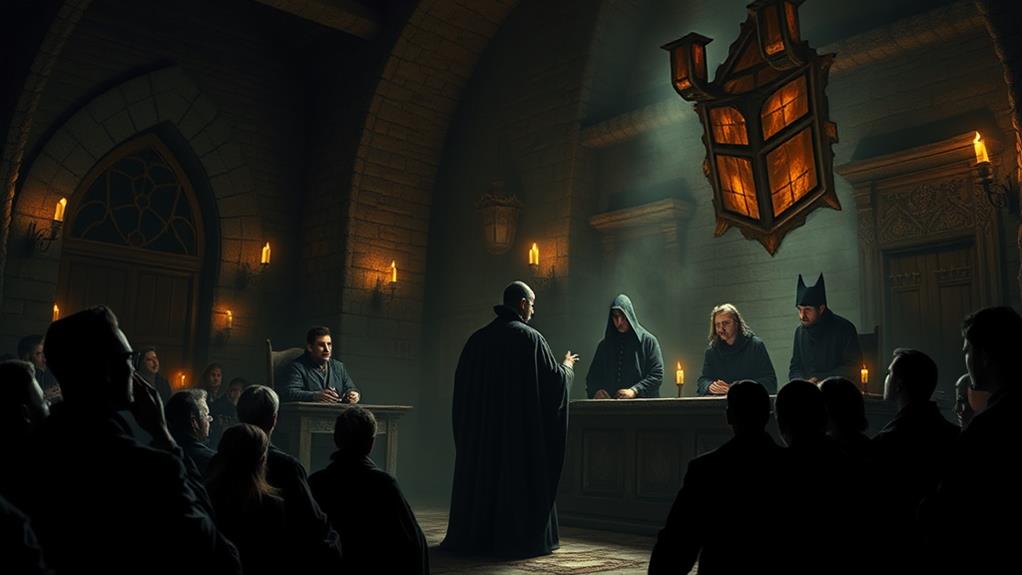
Igor Karkaroff's trial stands as a chilling reminder of the lengths to which wizards would go to save their own skin. When you look into Karkaroff's courtroom drama, you see a man desperate to escape the consequences of his dark past. Once a fervent Death Eater, he found himself facing the Wizengamot, the wizarding world's highest court. His strategy? Bargain his way to freedom by offering names of other Death Eaters.
Karkaroff didn't hold back. He named everyone he could think of, from known criminals to those still in hiding. You might recall him implicating Severus Snape, though Dumbledore's staunch defense of Snape's loyalty to the Order of the Phoenix thwarted that attempt. Karkaroff's revelations did lead to the capture and imprisonment of several Death Eaters, but his transparency was seen as self-serving.
In the end, Karkaroff secured a reduced sentence, but his actions earned him little respect. His trial underscored the complex moral landscape wizards navigated during Voldemort's rise. By leveraging his knowledge, Karkaroff displayed a willingness to betray former comrades, highlighting the desperate measures taken by those ensnared in the Dark Lord's web.
The Case of Bellatrix Lestrange
Often regarded as one of the most fanatical followers of Voldemort, Bellatrix Lestrange's trial captivated the wizarding world with its sheer intensity. You couldn't ignore the fervor in her eyes as she stood before the Wizengamot, unrepentant for her crimes. She was charged with torturing Frank and Alice Longbottom to insanity, among other heinous acts. The courtroom buzzed with a mix of fear and fascination as she proudly declared her loyalty to the Dark Lord.
Here's a brief look at key aspects of her trial:
| Aspect | Details |
|---|---|
| Date | December 1981 |
| Charges | Torture, Unforgivable Curses |
| Key Witnesses | Bartemius Crouch Sr., Aurors, Longbottoms |
| Verdict | Guilty |
| Sentence | Life imprisonment in Azkaban |
Bellatrix's unwavering allegiance to Voldemort was chilling. You saw her defiance in every word she spoke, rejecting any notion of remorse. Her trial wasn't just about her crimes; it symbolized the dark reach of Voldemort's influence. The life sentence to Azkaban didn't merely serve as punishment but was also a desperate bid to contain her malevolent zeal.
The Tribunal of Severus Snape

Bellatrix Lestrange's trial left a mark on the wizarding community, but it was the Tribunal of Severus Snape that truly tested the boundaries of justice and loyalty. You remember the tension in the room as Snape stood before the Wizengamot, his dark eyes revealing nothing. Accused of serving both Voldemort and Dumbledore, Snape's double life was under intense scrutiny.
You can't forget Dumbledore's testimony. The headmaster vouched for Snape's loyalty, explaining how Snape had turned spy for the Order of the Phoenix after Voldemort killed Lily Potter. Dumbledore's words carried weight, but doubt lingered. How could one man serve two masters without betraying one?
The evidence was damning yet ambiguous. Pensieve memories, testimonies from Death Eaters, and Snape's own actions during the Battle of Hogwarts painted a complex picture. You could see the Wizengamot members' struggle to discern truth from deception.
In the end, Snape was acquitted, but the tribunal left the wizarding world divided. Some hailed him as a hero, others as a traitor. The trial didn't just question Snape's actions; it forced you to confront the gray areas of morality and the price of loyalty.
At a Glance
You've journeyed through the wizarding world's most notorious trials, witnessing shocking secrets and scandalous stories. From Grindelwald's grim downfall to Umbridge's unforgivable actions, each case captivates and compels. Bagman's blunders, Black's betrayal, Gaunt's guilt, and Karkaroff's confessions reveal the depths of wizarding wickedness. Lestrange's lunacy and Snape's shadowy secrets leave you spellbound. Remember, every trial tells a tale of truth and treachery, forever etched in the annals of magical history.






